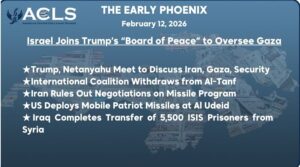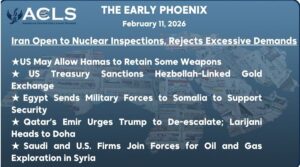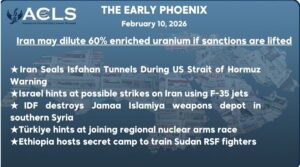TOP HEADLINES:
- Israel Prepares to Evacuate Palestinians from Rafah Ahead of Planned Offensive
- Hamas Opens Offices in Turkey, Signalling Possible Relocation of Exiled Leaders from Doha
- Qatar, Frustrated by Criticism, is Reevaluating its Mediation Efforts Between Hamas and Israel
- Iraq, Turkey, Qatar, and UAE Unveil $17 Billion “Development Pathway” to Connect Europe and the Gulf
- Erdogan Leaves Iraq Without Settling Kurdistan Oil Dispute
=======================
★ ISRAEL & PALESTINIAN TERRITORIES
-
Israel Prepares to Evacuate Palestinians from Rafah Ahead of Planned Offensive
Israeli Defense Forces (IDF) are gearing up to evacuate civilians from Gaza’s Rafah before launching an offensive against Hamas, per The Wall Street Journal. Coordination with the US and Egypt will facilitate evacuations to Khan Younis, providing shelters and aid. The operation aims to target Hamas operatives in a campaign Israel expects to last six weeks. Satellite images reveal a new camp being built by Israel near Khan Yunis to house Palestinian evacuees from Rafah. Reports suggest Israel aims to establish food distribution centers and field medical facilities in the area as part of its planned operation.
-
US Accuses Israel of Human Rights Violations in Gaza
A recent US State Department report accused Israel of severe human rights violations in Gaza, citing arbitrary killings, torture, and threats against journalists. The report also criticized Israel’s restrictions on freedom of expression and media, citing sources such as Amnesty International and Human Rights Watch. The report also highlighted escalating violence in the West Bank and Gaza by Israeli settlers and Palestinian militants and said that the Palestinian Authority’s inadequate response and Hamas’s impunity further compound the situation.
-
Hamas Opens Offices in Turkey, Signalling Possible Relocation of Exiled Leaders from Doha
Following a closed-door meeting between Turkish President Recep Tayyip Erdogan and Hamas political leader Ismail Haniyeh in Istanbul, expectations are high that Hamas will relocate its headquarters from Doha, Qatar, to Turkey. Hamas leaders would likely find Turkey a more secure location than Qatar, but Hamas denies it has plans to fully relocate from Doha.
=======================
★ IRAN
-
Human Right Watch Reports Iranian Forces Used Torture and Rape During 2022 Protests
Human Rights Watch (HRW) has unveiled harrowing details of rape, torture, and sexual assault committed by Iranian security forces against detainees during the 2022 national protests sparked by Mahsa Amini’s death. The report highlights systematic abuses, particularly against ethnic minorities, with victims recounting that Iranian authorities employed severe torture and sexual violence as tools for oppression and coercion.
-
Iran and Pakistan Seek to Elevate Trade to $10 Billion
Iranian Foreign Minister Amirabdollahian announced a significant initiative to elevate trade with Pakistan to $10 billion during President Raisi’s visit to Pakistan. Discussions covered a broad range of issues, including trade, energy, science, and security. The visit concluded with the signing of eight joint cooperation documents across multiple sectors.
-
Iranian Parliament Accuses Jordan of Collaboration with Israel, Calls for Accountability
The head of the Iranian parliament’s defense and security committee, Vahid Jalalzadeh, accused Jordan of collaborating in Israel’s attack against Iranian territory and said Jordan must be held accountable for helping to threaten Iranian national interests. Jalalzadeh said Jordan must clarify its stance on Israel’s actions and warned of reciprocal actions against any state complicit in attacks against Iran.
=======================
★ YEMEN
-
US and UK Face Limited Strategic Options in Yemen
As the US-British “Prosperity Guard” alliance sees diminishing returns from airstrikes in Yemen and European Union countries are withdrawing their naval forces from the Red Sea, America’s strategic options appear increasingly constrained. Washington is now compelled to consider alternative strategies or tougher sanctions against Sana’a, despite previous failures in the Arab Coalition’s ongoing war since 2015. Meanwhile, local allies are under pressure to intensify military fronts, even as Western-backed punitive measures and economic sanctions continue to be debated among policy-makers for their effectiveness in compelling peace according to the US perspective.
-
Houthi Militia Agrees to Direct Talks with Yemeni Government–But Only With No New Conditions Attached
The Houthi militia has agreed to direct discussions with the Yemeni government to negotiate a UN-proposed roadmap, contingent upon no changes to the previously agreed draft. This development was reported by the London-based Al-Quds Al-Arabi, noting that the meeting is being arranged by Riyadh and Muscat as part of efforts to finalize the roadmap.
=======================
★ IRAQ
-
Sudani Tells Erdogan Iraq Will Not Allow Use of Its Territory for Attacks on Neighboring Countries
Iraqi Prime Minister Mohammed Shia al-Sudani affirmed Iraq’s commitment to not allowing its territory to be used for attacks against neighboring countries. Speaking alongside Turkish President Recep Tayyip Erdoğan, al-Sudani emphasized a balanced policy based on mutual interests and good neighborliness. The leaders discussed various agreements, including water management and security cooperation, and signed several memoranda aiming to bolster economic and regional stability.
-
Kurdistan’s Oil Exports Not Discussed in Erdogan’s Talks with Iraq
During Turkish President Recep Tayyip Erdogan’s visit to Iraq, discussions on resuming Kurdistan’s oil exports through Turkey’s Ceyhan port were notably absent. The delay in negotiations with foreign oil companies operating in the autonomous region remains unresolved. The pipeline closure has removed nearly half a million barrels of oil daily from the market, with no set timeframe for resolving the export impasse.
-
Iraq and Turkey Unveil $17 Billion “Development Pathway” to Connect Europe and the Gulf
Iraqi government spokesman Basim Al-Awadi announced a $17 billion development project funded through oil revenues. The initiative, agreed upon with Turkey, involves constructing dams, new waterways, and converting some river evaporation to pipelines. This multi-year project, supported by a strategic quadrilateral agreement with Turkey, Qatar, and the UAE, aims to boost economic and financial stability in the region. This comprehensive plan also includes collaboration on the sale and pricing of oil.
-
Erdogan Did Not Discuss Ending Sulaimaniyah Airport Ban
Wafa Mohammed Karim from the Kurdistan Democratic Party stated that the Turkish ban on Sulaimaniyah Airport was not discussed during President Erdogan’s visits to Baghdad and Erbil. The ban, imposed due to alleged activities of the Kurdistan Workers’ Party (PKK) at the airport, remains in place, pending conditions set by Turkey for the Patriotic Union of Kurdistan. Ghayath Surji, a leader in the Patriotic Union, emphasized that Sulaimaniyah is governed by Iraqi federal laws and is free of any terrorist activities, urging the Iraqi government to clear the city from such accusations by Turkey.
=======================
★ SYRIA
-
Syrians Mourn Loss of Nation’s First Astronaut, Mohammad Fares
Syrians mourned the passing of General Mohammad Fares, Syria’s first astronaut, as a significant loss for both Syrians and the global community. The U.S. State Department expressed condolences, highlighting Fares’ commitment to excellence and his advocacy for Syrian freedom. Fares, who recently died in Gaziantep, Turkey, was buried in Azaz, Aleppo, with thousands attending the funeral, reflecting his enduring influence and legacy.
-
Report: Damascus Revokes Security Cards of Iran-Backed Militias
In an assertive move reportedly overseen by Russia to diminish Iranian influence within its security and military establishments, the Syrian government has ordered the annulment of security cards held by members of Iranian-backed militias. According to the North Press Agency, security branches have been instructed to detain those carrying these cards, search them, and arrest any wanted individuals or those avoiding mandatory military service. The actions, executed by the State Security and Military Police, are part of broader Russian-backed changes aimed at disbanding militias tied to Iran in Syria.
-
Tribal Violence Paralyzes Life in Jarablus, Aleppo Countryside
Violent clashes erupted on Monday in the town of Jarablus in Aleppo’s countryside, leading to the deaths of four individuals, including a girl, and injuries to seven others, among them women. The conflict arose between members of the Jais and Tai tribes during a protest demanding information on a kidnapped tribe member. The situation escalated with a Turkish military convoy intervening to extract Turkish teachers from a local university. The ongoing tension prompted widespread evacuations and a stringent curfew, halting daily activities and prompting security measures by Turkish-backed forces.
-
Russia Blocks Scheduled Syrian Constitutional Committee Meeting in Geneva
Dima Musa, from the Syrian National Coalition, reported that Russia obstructed the ninth session of the Syrian Constitutional Committee planned for April 22 in Geneva due to disagreements with Switzerland over the Ukraine conflict. The meeting, intended to be held in Geneva or another location, has not been rescheduled.
=======================
★ LEBANON
-
Hezbollah Fires Rockets at IDF Headquarters in Northern Israel
Hezbollah announced it targeted an Israeli military headquarters in northern Israel with “dozens” of Katyusha rockets as a retaliation for strikes on villages in southern Lebanon. The Israeli military reported detecting about 35 rockets fired from Lebanon towards the Ein Zeitim area without any casualties. This escalation is part of nearly daily exchanges of fire along the Lebanon-Israel border, intensified in the context of recent tensions related to the targeting of the Iranian consulate in Damascus earlier this month.
-
Deadlocked on All Other Issues, Lebanese Leaders Agree to Meet on Syrian Refugee Crisis
Lebanese Prime Minister Najib Mikati chaired an extensive meeting at the Grand Serail to address the situation of Syrian refugees. The session included key ministers, judicial authorities, and security officials. Participants discussed coordinated responses to the refugee issue, reflecting Lebanon’s multifaceted approach to managing the ongoing crisis.
-
Bassil Expels Bou Saab from Free Patriotic Movement
Elias Bou Saab, Deputy Speaker of the Lebanese Parliament, has been officially ousted from the Free Patriotic Movement led by MP Gebran Bassil after two years of escalating internal tensions within the party that previously led to the exclusion of other prominent members. Bou Saab, a key advisor to former President Michel Aoun and a notable figure within the party’s parliamentary bloc, has not participated in recent meetings, signaling deep-seated disagreements that culminated in this separation.
=======================
★ GULF REGION
-
Qatar, Frustrated by Criticism, is Reevaluating its Mediation Efforts Between Hamas and Israel
Qatar is currently reevaluating its role in mediating between Hamas and Israel, as announced by Majed Al-Ansari, spokesperson for Qatar’s Ministry of Foreign Affairs. Despite facing criticism, particularly from Israeli government officials, Qatar remains committed to its mediation efforts and to preventing further regional security deterioration. Al-Ansari stressed that Qatar would not tolerate being politically exploited by any party. The reevaluation does not impact Qatar’s humanitarian commitments to Palestine, with ongoing aid deliveries to Gaza and continued care for the injured in Doha.
-
Saudi Arabia and Iran Take New Steps Toward Reconciliation
Saudi Arabia and Iran are advancing reconciliation with significant moves, including the return of Umrah flights from Iran to Medina for the first time since 2016, and the appointment of a Saudi consul general in Mashhad. These developments are part of ongoing efforts under the “Beijing Agreement” to facilitate bilateral visa grants, including for religious visits. This renewed cooperation follows a history of diplomatic tensions.
-
Will the “Development Pathway” Announced in Baghdad Overshadow the Gulf Economic Corridor?
A new strategic project named “Development Path” was announced in Baghdad, aiming to connect Europe with the Arabian Gulf via Iraq and Turkey. This project could emerge as a competitor to the “Economic Corridor,” influenced by the ongoing US-China rivalry, by facilitating the transit of Chinese goods to Europe. Unlike the Economic Corridor, which involves the UAE, Saudi Arabia, Jordan, and Israel, the “Development Pathway” sees potential in strengthening trade relations for countries like Qatar, Iraq, and Turkey that were excluded from the former. Notably, the UAE’s participation in both projects raises questions about its strategic goals and the potential impacts on the existing Economic Corridor.
-
EU Grants Multi-Entry Visas to GCC Citizens
The European Union has approved multi-entry visas valid for five years for Gulf Cooperation Council citizens, enhancing travel and economic engagement. This decision, supported by France and announced during a high-level forum on regional security in Luxembourg, aligns with efforts to strengthen bilateral relations. This move reciprocates Saudi Arabia’s electronic visa access for EU nationals.
=======================
★ EGYPT AND NORTH AFRICA
-
Egypt Denies Israeli Accusation that Cairo Tolerates Weapons Smuggling into Gaza
Egypt’s General Intelligence Directorate chief, Diaa Rashwan, rebutted recent Israeli claims of weapons smuggling to Gaza, saying that Egypt asserts full sovereignty over its territory and controls its borders with Gaza and Israel. He said Egypt has destroyed over 1500 tunnels and strengthened the Gaza border wall.
-
Tanzanian-Flagged Vessel Rescued from Sinking in Suez Canal
Egypt’s Suez Canal Authority announced the successful rescue of the Tanzanian-flagged cargo ship “LABATROS” from sinking before it crossed the canal. The 12-member crew is safe, with ongoing assessments of the ship’s condition. The authority’s Port Said office received distress signals, prompting immediate rescue efforts involving tugboats and a rescue vessel. Teams are inspecting the ship for damage and determining the cause of the incident. The vessel, 94 meters long with a 15-meter beam and a 6-meter draft, was laden with 3,000 tons, bound from Lebanon to Egypt’s Adabiya Port.
=======================
★ TURKIYE
-
Türkiye and Iraq Ink 26 Accords, Including Key Infrastructure Deal
During President Recep Tayyip Erdogan’s historic visit to Baghdad, Türkiye and Iraq signed 26 agreements, spanning energy, trade, education, tourism, sports, health, and defense. Among the deals, a landmark Memorandum of Understanding (MoU) was sealed for the Development Pathway project involving Türkiye, Iraq, Qatar, and the UAE. This initiative aims to construct a 1,200-kilometer highway and railway network, connecting Grand Faw Port to the Turkish border via key Iraqi cities. Turkish Transport Minister Abdulkadir Uraloglu emphasized the project’s significance for regional trade, foreseeing broader benefits for all involved nations.
-
Erdogan Says Hamas Unlikely to Leave Qatar
Turkish President Recep Tayyip Erdogan, during his return from Iraq, stated that Hamas is unlikely to leave Qatar, with no signs of change from Doha. He highlighted Israel’s complete control over Gaza could lead to further incursions into Palestinian territories. Erdogan also noted Iraq’s awareness and willingness to eliminate the Kurdistan Workers’ Party (PKK), aligning with Turkey’s ongoing fight against terrorism under international law. He hailed a new phase of cooperation with Iraq, focusing on combating militants and economic ties, acknowledging both nations’ mutual benefits in addressing these security threats and water needs.
-
Türkiye’s Drones are Shaping Africa’s Security Landscape
Türkiye’s drone technology is gaining prominence in African countries, affecting the continent’s security architecture. Unlike France, whose military presence is declining, Türkiye is assuming a growing role in aiding African governments against separatist movements. Defense collaborations with nearly 30 African nations extend beyond arms deals, fostering robust security alliances. Türkiye’s drones empower states to counter threats more cost-effectively, marking a significant shift in Africa’s security architecture.
-
Erdoğan Warns Armenia: Door to Normal Relations Won’t Remain Open Forever
Returning from Iraq, President Erdoğan addressed journalists, cautioning Armenia against being held captive by its diaspora’s narratives. Referring to Armenian Prime Minister Nikol Pashinyan’s remarks on the 1915 events, Erdoğan emphasized the need to abandon baseless narratives and embrace historical realities. He urged Armenia to seize the moment, warning that opportunity doesn’t linger indefinitely. Acknowledging external provocations, Erdoğan urged Armenia to choose a path toward enlightenment, emphasizing the importance of decisive action in shaping a brighter future and the necessity of historical accuracy in navigating regional dynamics.
=======================
📌 Incase you missed it,
📰 THE EARLY PHOENIX April 22 , 2024
📰 THE EARLY PHOENIX April 18 , 2024
📰 THE EARLY PHOENIX April 17 , 2024
📰 THE EARLY PHOENIX April 16 , 2024
🔗 Follow the latest news from the American Center for Levant Studies via Google News



